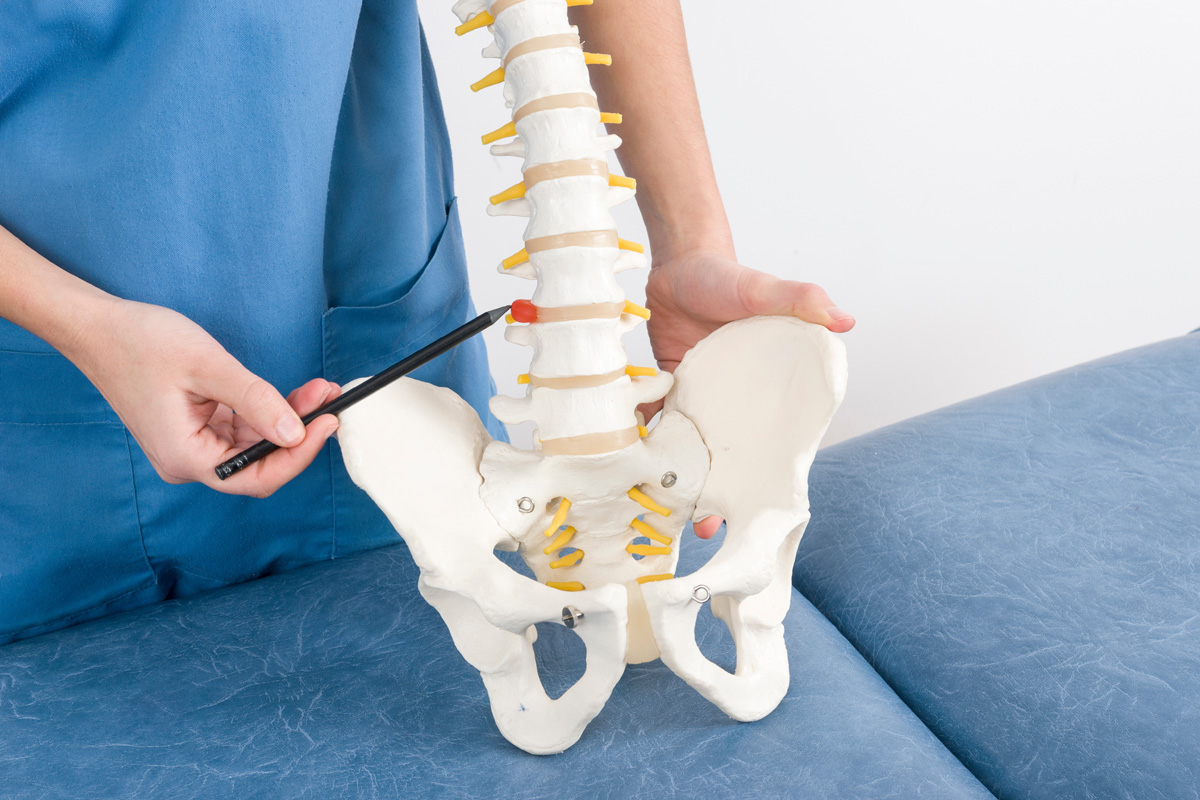The discussion of herniated disc emergency symptoms is essential in the field of health and medicine. These symptoms—such as acute, radiating pain; numbness or tingling in the extremities; and weakness in the muscles—can be debilitating and may greatly interfere with an individual’s quality of life. More importantly, in some instances, these symptoms may indicate a medical emergency, necessitating prompt attention. As we delve deeper into this discussion, we will explore how recognizing these symptoms, understanding their implications, and seeking timely medical intervention can be pivotal in managing this condition effectively.
Understanding Herniated Discs
A herniated disc, a prevalent medical condition, is characterized by the protrusion or rupture of an intervertebral disc — the cushion-like pads situated between the vertebrae of the spinal column. This condition is a common source of neck, lower back, and sciatica pain.
One of the primary causes of herniated discs is disc degeneration, a natural process that occurs as we age. The intervertebral discs lose their flexibility, elasticity, and shock-absorbing characteristics, leading to micro-tears in the outer layer of the disc. Over time, the inner gel-like nucleus of the disc can leak out through these tears, causing the disc to bulge or rupture.
When conservative treatments for a herniated disc fail to provide relief, surgical interventions may be considered. These include discectomy, where the herniated portion of the disc is removed; laminectomy, which involves removing a portion of the vertebra to alleviate nerve pressure; and spinal fusion, in which two or more vertebrae are joined together to stabilize the spine. It’s essential to understand that while surgery can be highly effective, it’s usually considered only after non-surgical treatments have not provided sufficient relief.
Common Causes of Herniated Discs
While aging and disc degeneration rank as primary contributors to the occurrence of herniated discs, several other factors can also play a significant role in the development of this condition. Disc degeneration causes include the gradual loss of water content in the discs, leading to reduced flexibility and increased susceptibility to injury and inflammation. This process is usually a part of the normal aging cycle, but can be exacerbated by certain lifestyle factors.
Lifestyle factors such as sedentariness and obesity can contribute to the risk of herniated discs. A sedentary lifestyle can lead to poor muscle tone and posture, both of which can put undue pressure on the spine and discs. Similarly, obesity increases the load on the discs, especially in the lower back, leading to premature wear and tear.
Smoking is another lifestyle factor linked to an increased risk of disc degeneration. Nicotine can impede blood flow to the discs, hindering their capacity to absorb nutrients and heal. Additionally, heavy lifting and repetitive strenuous activities can strain the discs, making them susceptible to herniation. These factors, combined with genetic predisposition, underscore the multifaceted causes of herniated discs.
Non-Emergency Symptoms
While the focus has been mainly on emergency symptoms of a herniated disc, it is equally important to recognize signs that may not require immediate medical attention. These non-emergency symptoms, although less severe, can impact daily life and often signal the onset of disc-related discomfort. A thorough understanding and management of these mild symptoms can influence prognosis and treatment strategies.
Identifying Non-Emergency Symptoms
Despite not requiring immediate medical attention, non-emergency symptoms of a herniated disc should not be ignored, as they can signify underlying issues and potentially lead to further discomfort or complications. Insights into Disc Protrusion and a discussion about Disc Degeneration can provide a better understanding of these symptoms.
Non-emergency symptoms may include:
- Muscle weakness: This is caused by pressure on the spinal nerve due to disc protrusion, affecting the muscles that the nerve controls.
- Pain during certain movements: This is a common sign, and it may worsen when moving in specific ways.
- Tingling or numbness: These sensations can arise if the herniated disc is pressing on a nerve.
- Loss of bladder or bowel control: This symptom is rare but requires immediate medical attention if it occurs.
Understanding Disc-Related Pain
Understanding disc-related pain, a thorough examination of the intricate interactions between the spinal structures and the nervous system is necessary to assess a non-emergency symptom of a herniated disc. In this scenario, disc degeneration causes can vary, including aging, injuries, or genetic predisposition. This degeneration can lead to disc herniation, where the nucleus pulposus, the soft inner part of the disc, breaches the protective outer layer, causing nerve irritation. The subsequent pain can range from mild discomfort to debilitating pain. Pain relief techniques are multifaceted, often involving conservative measures such as physical therapy and medication. However, in cases where these prove ineffective, surgical intervention may be required. A thorough understanding of these aspects is essential for managing disc-related pain effectively.
Managing Mild Symptoms
In the management of mild, non-emergency symptoms associated with a herniated disc, a strategic approach that prioritizes conservative treatments can be highly effective. This approach often involves a combination of pain relief methods and lifestyle adjustments.
- Over-the-counter medications: Nonsteroidal anti-inflammatory drugs (NSAIDs) are commonly used for pain and inflammation.
- Physical therapy: Strengthening and stretching exercises can relieve pressure on the nerve.
- Lifestyle adjustments: Maintaining a healthy weight, adopting good posture, and avoiding activities that strain the back can prevent exacerbation.
- Alternative therapies: Treatments like acupuncture or massage can provide additional relief.
This multipronged approach not only manages symptoms but also contributes to overall spine health. Importantly, these strategies should be tailored to the individual’s needs and monitored by a healthcare professional.
Emergency Symptom: Sudden, Severe Pain
One of the most alarming signs of a herniated disc emergency is the onset of sudden, severe pain, typically felt in the lower back, neck, or even radiating down the legs. This symptom is characterized by its abrupt commencement and excruciating intensity, often leaving the patient immobile and deeply distressed.
Pain duration in such cases can be highly variable, ranging from a few hours to several days. It may be constant or sporadic, with periods of relative relief interspersed with episodes of heightened discomfort. The longer the pain persists, the more critical it is to seek immediate medical attention.
Pain alleviation, on the other hand, is rarely achieved without intervention in these severe cases. Over-the-counter pain relievers may provide marginal relief, but they do not treat the underlying issue and are thus insufficient. Physical therapies, such as cold or hot compresses, may also be ineffective.
Emergency Symptom: Numbness or Weakness
In the context of herniated disc emergencies, numbness and weakness are vital symptoms that require immediate attention. The process of correctly identifying disc-related numbness is essential, as it may represent the onset of nerve damage. Simultaneously, understanding and managing weakness symptoms could be instrumental in preventing further complications and enhancing patient recovery.
Identifying Disc-Related Numbness
Disc-related numbness, an essential emergency symptom of a herniated disc, often manifests as an unsettling loss of sensation or weakness in specific areas of the body. Numbness triggers can include anything from prolonged sitting, lifting heavy objects, or sudden movements, to a gradual degeneration of the disc. If left untreated, this numbness can escalate to disc related paralysis, a severe condition that requires immediate medical attention.
Identifying disc-related numbness involves recognizing key symptoms such as:
- A tingling or prickling sensation, often likened to ‘pins and needles’
- Chronic or intermittent numbness in extremities (arms, hands, legs, feet)
- Unexplained muscle weakness
- Difficulty in coordinating movements or maintaining balance
Understanding these symptoms is vital for early detection and treatment of this condition.
Managing Weakness Symptoms
Addressing the issue of muscle weakness induced by a herniated disc necessitates a thorough understanding of the condition’s early warning signs and effective management strategies. Exercising caution is important, especially during physical activities, to prevent exacerbating the condition. Regular, gentle exercises may improve muscle strength and promote healing.
Dietary adjustments also play an important role in managing weakness symptoms. A balanced diet rich in anti-inflammatory foods can alleviate symptoms and support disc health. Include foods high in omega-3 fatty acids, antioxidants, and vitamins D and B12.
Moreover, it’s crucial to stay hydrated and maintain a healthy weight. Overweight individuals exert more pressure on their discs, potentially worsening the herniation. Professional guidance can ensure these strategies are tailored according to individual needs.
Emergency Symptom: Loss of Bladder Control
One serious symptom of a herniated disc emergency is the sudden, unexpected loss of bladder control. This condition, known as incontinence, can carry a heavy stigma due to societal norms and expectations about personal hygiene and control. The psychological impact of incontinence is significant, often leading to embarrassment, anxiety, and diminished self-confidence.
The underlying cause of this unexpected loss of bladder control is the compression of nerves in the lower spinal cord that regulate urinary function. This can result from a severely herniated disc that is pressing against these nerves.
Understanding the potential symptoms can help patients seek immediate medical attention. These include:
- Involuntary leakage of urine, especially during physical activities such as coughing or sneezing.
- Frequent, sudden urges to urinate that are difficult to control.
- Difficulty starting a urine stream or fully emptying the bladder.
- Waking up frequently during the night to urinate.
It is essential to consult with a healthcare professional if any of these symptoms occur, as they can indicate a serious underlying condition that requires immediate treatment. Medical intervention can help manage the symptoms and mitigate the psychological impacts of incontinence.
Emergency Symptom: Loss of Bowel Control
One critical emergency symptom associated with herniated discs is the loss of bowel control, a condition technically known as fecal incontinence. This can occur when the herniated disc compresses nerves that control bowel function, leading to a lack of voluntary control over bowel movements. Addressing this symptom promptly and effectively is essential in managing the broader implications of a herniated disc and maintaining the patient’s quality of life.
Understanding Bowel Control Loss
In the context of herniated disc emergencies, a sudden loss of bowel control can be a critical symptom indicative of severe nerve compression, necessitating immediate medical attention. This loss can be temporary or progressive, manifesting as either occasional leakage or complete incontinence.
Understanding the importance of bowel health in this scenario can be beneficial. Diet modifications might be required to manage symptoms and maintain peak health. Consider the following points:
- Loss of bowel control might be accompanied by other symptoms such as numbness or weakness in the legs.
- Diet modifications could include increasing fiber intake to promote regular bowel movements.
- Monitoring bowel habits can help in early detection of abnormalities.
- Regular physical activity can support healthy bowel function, potentially mitigating some symptoms.
Link: Herniated Discs, Incontinence
The relationship between herniated discs and incontinence, specifically loss of bowel control, is a complex one, involving severe nerve compression that necessitates immediate and urgent medical attention. This debilitating symptom is often the result of substantial disc degeneration. Prevention of such a condition is vital and requires lifestyle adjustments that involve maintaining a healthy weight, regular exercise, and correct posture. Chronic heavy lifting, smoking, and sedentary habits can exacerbate the risk of disc degeneration. It’s imperative to understand that in the event of sudden loss of bowel control linked to back pain or numbness in the saddle area, immediate medical intervention is necessary. Such symptoms indicate a medical emergency, potentially signifying cauda equina syndrome, a severe type of nerve compression.
Managing Unexpected Bowel Issues
Dealing with unexpected bowel issues, particularly loss of bowel control, is an urgent matter that requires swift and effective management strategies, particularly in the context of potential herniated disc complications.
This can be an uncomfortable and distressing symptom, but there are ways to help manage this issue:
- Dietary Adjustments: Altering your diet to include more fiber can help regulate bowel movements.
- Medication: Certain medications can assist in managing bowel control issues.
- Physical Therapy: Specific exercises can strengthen pelvic muscles, improving bowel control.
- Psychological Support: The Mental Health Impact of such a symptom can be significant, seeking psychological help can be beneficial.
These strategies can help to manage bowel control issues, providing relief and improving quality of life.
Emergency Symptom: Difficulty Walking
One notable emergency symptom of a herniated disc is difficulty walking, a condition that can manifest as an imbalance, staggering, or an inability to maintain a normal gait. Balance issues can be particularly problematic, as they may lead to falls, potential injuries, and further complications.
These mobility disturbances can stem from nerve compression resulting from the herniated disc. This compression can disrupt the normal signals that the brain sends to the muscles responsible for maintaining balance and walking. As a result, a patient may experience muscle weakness, numbness, or a tingling sensation in the lower extremities, all of which could impede normal walking patterns.
In severe cases, individuals may need to rely on mobility aids such as walkers or canes to navigate their environments safely and efficiently. These aids can provide stability and aid in balance, reducing the risk of falls and injuries. However, they are not a definitive solution, but rather a temporary measure to maintain mobility and independence during the management and recovery process.

When to Seek Medical Attention
Given the severity of symptoms such as difficulty walking, it becomes essential to understand when medical intervention should be pursued for a herniated disc. Recognizing the signs that warrant immediate medical attention can help mitigate the risk of irreversible nerve damage and can expedite the process of Immediate Pain Relief.
The following scenarios should prompt an Emergency Response Plan:
- Sudden onset of severe back or neck pain
- Difficulty walking or maintaining balance
- Loss of bowel or bladder control
- Progressive weakness or numbness in the legs or arms
It’s vital to remember that these symptoms may indicate a serious condition requiring prompt medical intervention. In the context of a herniated disc, they may suggest a severe nerve compression that could result in permanent nerve damage if not addressed timely.
Diagnosis and Treatment Options
In the field of healthcare, accurate diagnosis and appropriate treatment selection are essential for managing a herniated disc effectively. Diagnosing a herniated disc often involves a thorough physical exam, a detailed medical history, and imaging tests such as CT scans or MRIs. These tools enable healthcare professionals to visualize the spine and surrounding structures, identifying the location and severity of the herniation.
Upon diagnosis, treatment options can be categorized into two primary approaches: conservative treatments and surgical interventions. Essential treatment options aim to alleviate symptoms and may include medications, physical therapy, and lifestyle modifications. However, when these measures prove ineffective, surgical interventions may be considered. Procedures such as a discectomy or a laminectomy can provide relief by removing the herniated portion of the disc or reducing pressure on the spinal nerves, respectively.
Alternatively, alternative therapies such as acupuncture and chiropractic care are gaining recognition for their potential to manage herniated disc symptoms. These therapies can complement traditional treatments, providing a holistic approach to patient care. However, the effectiveness of these therapies may vary, necessitating further scientific research and individual consultation with a healthcare provider. Regardless of the chosen treatment, patient education and active participation are essential to achieving favorable outcomes.
Prevention and Management Tips
While effective diagnosis and treatment are paramount in managing a herniated disc, it is equally valuable to discuss preventive measures and management strategies to avoid exacerbation of the condition. Key preventive strategies include maintaining disc hydration and employing posture correction techniques, both of which can greatly reduce the risk of disc herniation and its subsequent complications.
Disc hydration is essential as it helps maintain the disc’s flexibility, reducing the likelihood of rupture or herniation. Adequate hydration can be achieved through regular intake of water and a diet rich in water-based foods.
Posture correction techniques, on the other hand, can help maintain the proper alignment of the spine, thereby preventing undue pressure on the discs. This can be achieved through regular exercises aimed at strengthening the core muscles and maintaining an erect posture while sitting or standing.
- Disc Hydration Importance: Maintains disc flexibility and reduces the risk of herniation.
- Posture Correction Techniques: Helps in keeping the spine in correct alignment and prevents undue pressure on the discs.
- Regular Exercise: Strengthens core muscles, further supporting good posture.
- Healthy Diet: A balanced diet rich in nutrients promotes overall spinal health.
Managing these factors can significantly lower the risk of herniated disc emergencies.
Frequently Asked Questions
Can I Exercise With a Herniated Disc?
You can exercise with a herniated disc, but it’s essential to choose disc-friendly workouts to avoid aggravating the condition. Proper posture is also important during exercises to make sure the spine is well-supported.
Are Herniated Discs Hereditary?
Herniated discs are not directly hereditary. However, a genetic predisposition can make some individuals more susceptible to disc degeneration factors, which can increase the risk of developing a herniated disc condition.
How Does Weather Affect Herniated Disc Pain?
Seasonal fluctuations and barometric pressure changes can potentially exacerbate herniated disc pain. Lower temperatures may increase muscle tension around the disc, while pressure shifts can affect nerve endings, amplifying discomfort.
Can a Herniated Disc Heal on Its Own?
A herniated disc can potentially heal on its own through a process called disc reabsorption. Non-surgical treatments, including physical therapy and medication, can also aid in the recovery process and relieve symptoms.
Does Diet Influence Herniated Disc Conditions?
Diet can indeed influence herniated disc conditions. Disc nutrition importance cannot be understated; a balanced diet promotes disc health. Additionally, excessive consumption of inflammatory foods can exacerbate conditions like herniated discs by promoting inflammation.


